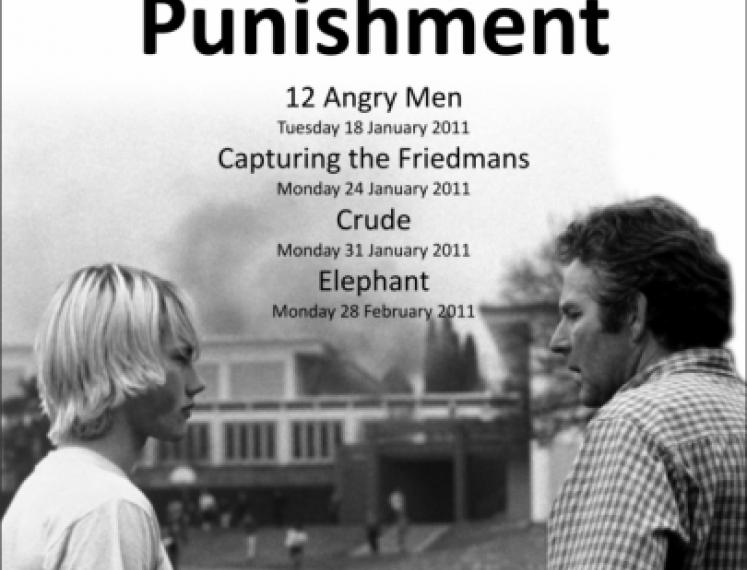Crime and Punishment
12 Angry Men | Capturing the Friedmans | Crude | Elephant
Legal systems elaborate rights and responsibilities in a variety of ways. Media and society seem to have their own judgments. Films often reflect the complex relation between crime and punishment, showing that most crimes and law cases are not as black and white as we might want them to be… 12 Angry Men
Directed by Sidney Lumet (US 1957, 96 minutes, English spoken, Dutch subtitles)
Introduction by John Griffiths

Date: Tuesday 18 January 2011

Eleven jurors are convinced that the defendant is guilty of murder. The twelfth has no doubt of his innocence. How can this one man steer the others toward the same conclusion? 12 Angry Men is critically acclaimed to be one of the best films ever made.
12 Angry Men is about just that, twelve men who appear to deliberate over a clear-cut case about a young man who has apparently killed his father. With irrefutable evidence and witnesses, one man stands up for the young boy in the hopes of discovering the truth. One man against eleven cared enough to look deeper into what should have been a simple case. They retire to a jury room to do their civic duty and serve up a just verdict for the defendant whose life is in the balance. The frightened, teenaged defendant is on trial, as well as the jury and the American judicial system with its hypothetical sense of infallibility, fairness and lack of bias.
John Griffiths is Professor of Sociology of Law (Emeritus).
Capturing the Friedmans
Directed by Andrew Jarecki (US 2003, 107 minutes, English spoken, Dutch subtitles)
Introduction by Fred Janssens

Date: Monday 24 January 2011

A family in crisis is ‘captured’ through home video in this powerful documentary about the Friedmans, an upper-middle-class family who found their world turned upside down when father and son were charged with child molestation.
The Friedmans are a seemingly typical, upper-middle-class Jewish family whose world is instantly transformed when the father and his youngest son are arrested and charged with shocking and horrible crimes. Caught up in hysteria and with their Great Neck community in an uproar, the family undergoes a media onslaught. But they shot the really interesting footage themselves. Given access to the family videos, Jarecki constructs his film as an investigation, which constantly subverts our expectations. The film displays not just the life of a family but also of a community, a legal system, and an era. By constantly changing perspectives and altering the audience's judgments and understanding, Capturing the Friedmans embodies the difficulty of capturing the truth.
Fred Janssens is a lawyer and former public prosecutor.
Crude
Directed by Joe Berlinger (US 2009, 104 minutes, English and Spanish spoken, English subtitles)
Introduction by Marcel Brus

Date: Monday 31 January 2011

One of the largest and most controversial environmental lawsuits on the planet; Crude shows the inside story of the ‘Amazon Chernobyl’ case: a landmark lawsuit of 30,000 indigenous and colonial rainforest dwellers against the U.S. oil giant Chevron.
--
From the mid-1960s until the early 1990s, Texaco (now Chevron) dumped 18 billion gallons of oil and toxic waste into the Amazon rainforest of Ecuador, creating a 4,500 km2 ‘cancer death zone’. Inhabitants of the Ecuadorian Amazon started the landmark case against the U.S. oil giant Chevron. The Ecuadorians claim that the pollution has resulted in increased rates of cancer and other health ailments. They further allege that the oil operations in the region contributed to the destruction of indigenous people. Chevron vociferously fights the claims, charging that the case is a complete fabrication, perpetrated by ‘environmental con men’ who are seeking to line their pockets with the company’s billions.
Crude shows the inside story of one of the largest and most controversial environmental lawsuits on the planet. The case is set against a backdrop of the environmental movement, global politics, celebrity activism, human rights advocacy, the media, multinational corporate power, and rapidly-disappearing indigenous cultures.
Marcel Brus is Professor of International Public Law.
Elephant
Directed by Gus Van Sant (US 2003, 81 minutes, English spoken, Dutch subtitles)
Introduction by Jan Kornelis Dijkstra

Date: Monday 28 February 2011

Elephant shows an ordinary day on an American high school. Except that it’s not. Inspired by the mass shootings at Columbine High School in 1999, Elephant demonstrates high school life as complex landscape where the vitality and beauty of young lives can shift from light to darkness with surreal speed.
Several ordinary high school students go through their daily routine. Best friends Eric and Alex, are two of the students and very much a part of the fabric of the high school and its array of student actions. In fact, it's hard to distinguish them from all the other students. Alex plays classical piano whereas Eric plays video games. They calmly watch Nazi programs on TV and purchase firearms over the Internet. They seem just as ordinary and interesting as any of the other students. They analytically draw up plans for their merciless killing spree, indicating that they have enough bombs and ordinance to last the afternoon. The film begins a short time before the shooting occurs, following the lives of several characters both in and out of school, who are unaware of what is about to unfold.
Jan Kornelis Dijkstra is assistant Professor Theoretical Sociology.



